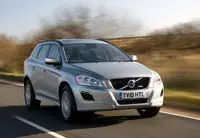New And Upgraded Engines in Volvo's 2011 Models
MARLOW, UNITED KINGDOM – May 6, 2010: The Volvo range has been enhanced with a range of new engine additions and enhancements for the 2011 Model Year update. These new engines include the addition of a new two-litre five cylinder diesel powerplant which is introduced to the XC60 and XC70 models and replaces the familiar four-cylinder 136 PS unit in the C30, S40, V50, C70, V70 and S80. All new engines are available to order now.
The new five-cylinder 2.0D diesel is, in principle, the same engine as the well-established 2.4-litre diesel, but its displacement has been reduced with a shorter stroke to optimise fuel consumption. The injection system also has a different type of piezoelectric fuel injector compared with the D5 engine. These injectors minimize fuel consumption with their exceptionally rapid and precise injection pulses under high pressure to promote extremely efficient combustion. This engine is now available to order in all cars across the range apart from the Volvo XC90 seven-seat SUV.
"This new engine offers greater driving pleasure across the range and our strong drive to reduce carbon dioxide emissions means that fuel consumption has been cut as well," says Magnus Jonsson, Senior Vice President Product Development at Volvo Cars.
As part of Volvo's new engine nomenclature and to simplify Volvo's engine badging, all new engines, including the new five-cylinder 2.0D, will be badged depending on the power output. For example, the 150 PS version of the new 2.0D in the C30, S40, V50 and C70 is named D3 and an uprated 177 PS version of this same engine is labeled D4. In the Volvo S80, V70, XC70 and XC60 the newly developed 2-litre diesel engine produces 163 PS and is badged the D3. This hierarchic naming has been introduced to allow customers to more easily understand which engine is the most powerful and which fuel it is driven by – D for diesel and historically T has been used for Volvo's petrol cars. Volvo's naming strategy also follows the principle that the higher the number the more powerful it is - a D5 engine has more power that a D3.
As an example, the award-winning Volvo XC60 range has been enhanced with the addition of the new two-litre diesel 163 PS front-wheel-drive powerplant. The new D3 engine replaces the 2.4D FWD 175 PS variant and will become the new DRIVe engine emitting only 154g/km of CO2 emissions and 47.9 mpg.
The new frugal D3 DRIVe will also appeal to fleet managers, not only because CO2 emissions fall below the all-important 160g/km Writing Down Allowance, but it's also the first time the XC60 is available with a 2.0D engine. With the DRIVe model fitting in neatly below the crucial 160g/km tax band at 154g/km, its Benefit-in-Kind credentials are strong with a 20 per cent tax payer paying £98 per month and 40 per cent tax payer paying £195 for the XC60 D3 DRIVe ES. The new D3 engine is also available with automatic transmission, however, as this variant delivers slightly higher CO2 levels it will not be badged DRIVe.
New engines in the Volvo C30 SportsCoupe, S40 Saloon, V50 Sportswagon
and C70 Coupe/Convertible
The new five-cylinder 2.0D engine is
fitted in two guises to the C30, S40, V50 and C70. In its lower state of
tune, it produces 150 PS and is badged D3 while an uprated 177 PS version
is named D4. Both emit only 134 g/km of CO2 and offer drivers 55.4 mpg in
the C30, S40 and V50 and 47.9 mpg and 154 g/km in the C70. The D3 and D4
are available in both manual and automatic transmission across all four
models.
New D2 engine with 114 g/km CO2 emissions
The C30, S40 and V50
are also available with a new four cylinder 1.6-litre diesel engine -
badged D2. Fuel consumption in all three models is 65.7 mpg, which
corresponds to CO2 emissions of only 114 g/km. The engine produces 115 PS
and 270 Nm of torque and now comes with a six-speed manual gearbox as
standard. The previous 1.6D 109 PS DRIVe engine with Start/Stop will remain
in the C30, S40 and V50 ranges along with the 1.6, 2.0 and range-topping T5
petrol engines. The 2.4i and D5 are no longer available in the C30, S40,
V50 and C70 models.
The D2, D3 and D4 engines all meet the Euro 5 emission standards.
Volvo S80 executive saloon, XC60 crossover, V70 and XC70 premium
estates
In the Volvo S80, V70, XC70 and XC60, the newly developed
2-litre diesel engine produces 163 PS and 400 Nm of torque and is badged
D3. The D5 twin-turbo diesel and high-performance T6 petrol engine remain
in the ranges and have both benefitted from improvements.
The D5 205 PS has seen a drop in CO2 emissions. For example, the D5 emissions in the XC60 have fallen from 183 g/km to 174 g/km. The T6 powertrain in the V70, XC70 and XC60 has been upgraded to offer a 19 PS boost to a storming 304 PS at 440 Nm thanks to a reduction in internal friction. Maximum torque is achieved between 2100 and 4200 revs. This results in rapid acceleration and smooth driving properties. Emissions have also been reduced – Volvo XC60 T6 emissions, for example, have dropped from 274 g/km to 249 g/km. The D3, D5 and T6 engines are all Euro 5 compliant.



